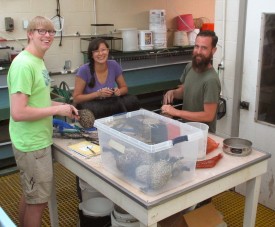Ecologically diverse communities are resilient communities. But can this diversity also help prevent the spread of disease? This question was at the heart of research conducted during experiments conducted by student interns at the Haskin Shellfish Research Laboratory in Bivalve, New Jersey. As part of a collaborative project with Old Dominion University, that is funded by the National Science Foundation (NSF), Rutgers undergraduate students Joseph Looney, William Schroer and Lauren Huey ran experiments that examined how oysters get sick.
It is well known that oysters provide a home for other species in coastal waters. Animals like sponges, tunicates, mussels and others use oysters as a base on which to anchor in the turbid and tidal waters of estuaries. The student researchers found that when oysters live closely with other species of filter feeders, they don’t get sick as often. It’s a symbiotic relationship in which oysters provide habitat and the oyster reef tenants provide disease protection by removing disease particles from the water.
These findings and other data collected during the internship program will be used in novel computational models to study how diseases are transmitted in the ocean. The models form the cornerstone of the NSF-funded Ecology of Infectious Disease project ongoing at the Haskin Lab, with collaborators at Old Dominion University and the University of Southern Mississippi. The ultimate goal of the project is to better understand how disease epidemics develop and spread in marine systems.


